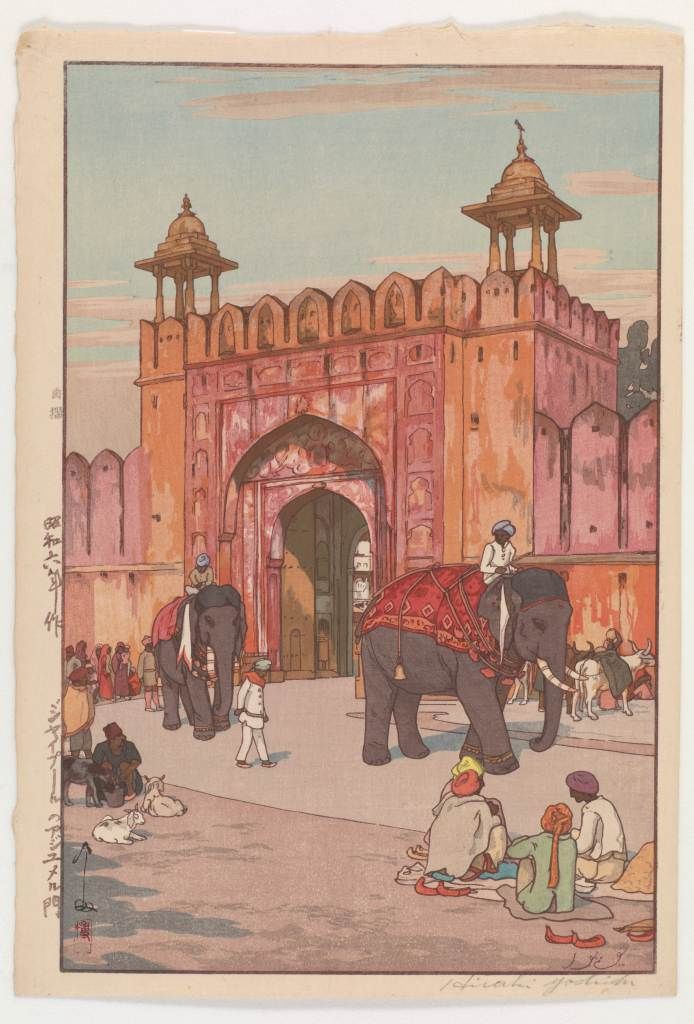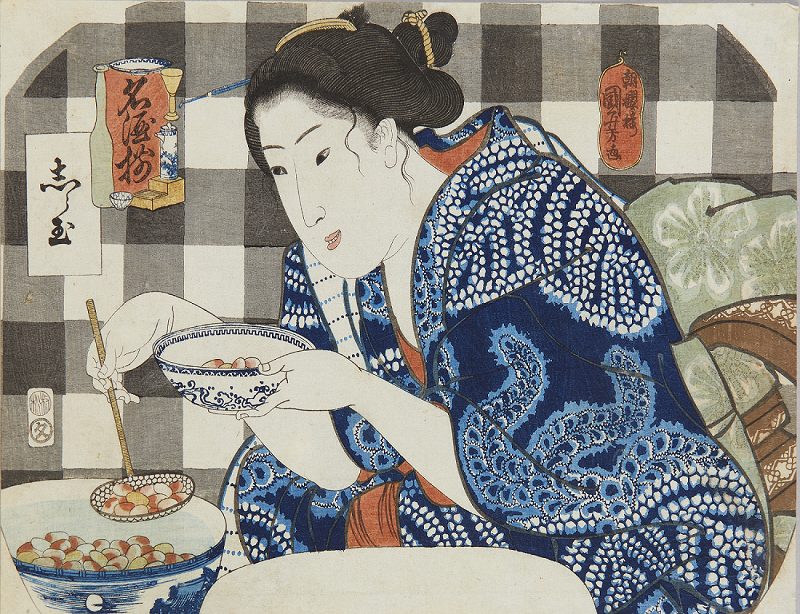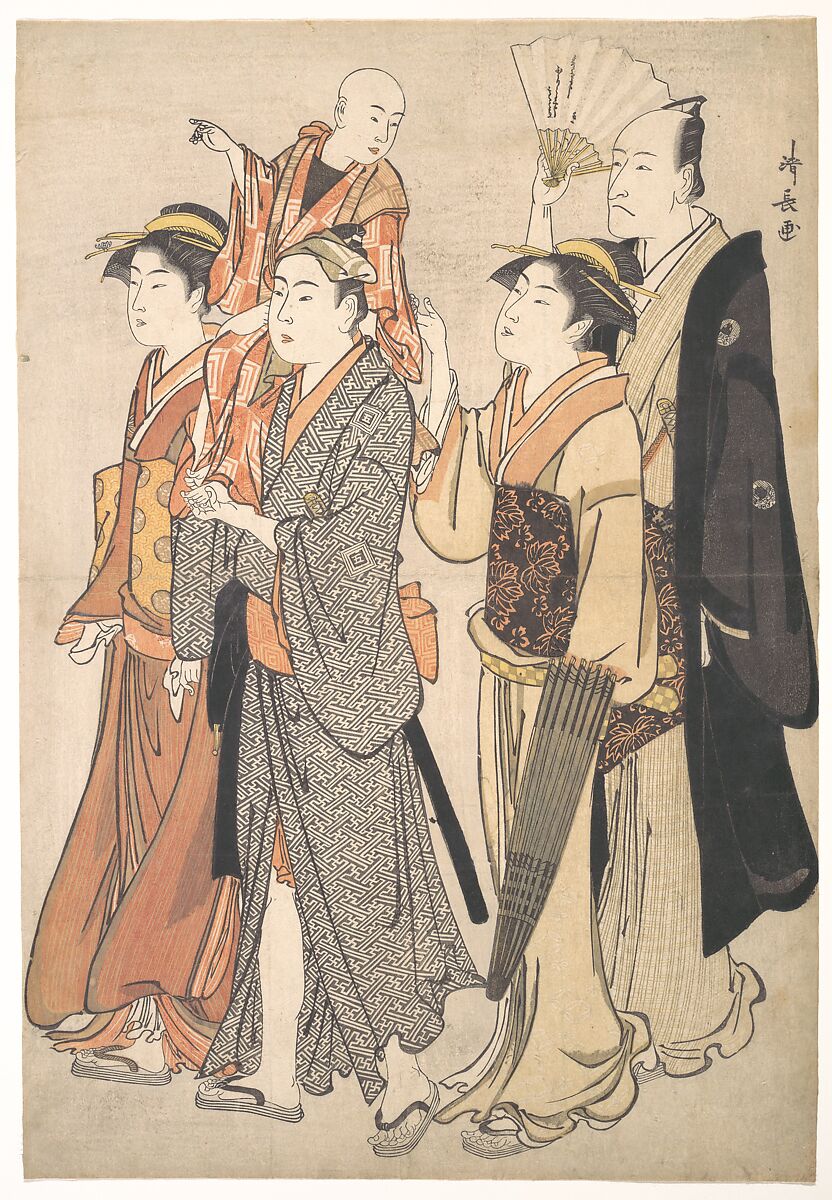Japan. India. On one level, poles apart. On another level, however, the two countries are quite remarkably similar. “Similar, really?” may be the reaction of many.
It really does depend on how you compare the now 1.4 billion strong growing powerhouse India, and Japan, still the world’s third largest economy with a population of just 0.124 billion. I would venture to say, actually, despite the obvious differences, India and Japan, are quite indeed similar in many levels.
Let us start by comparing 3 things – food, gods, and family.
‘Shiratama’ from the famous Sake series by Utagawa Kuniyoshi, Edo Glass Collection
First, take food. Different yet similar.
Think spices, bold and hot curries, strong vegetarian food traditions with diverse divergent regional dishes found in India, but of course with fish seafood poultry lamb etcetera as well, cooked up to give birth to rich curries which at times may be quite heavy. Exotic, daring use of multiple spices, hours to cook. Enjoyed by hand, nice.
Japanese cuisine, on the contrary, may be more subtle and light. Take sushi which may come across as bland to many Indians, but in fact is deeply satisfying to the palate, based on a “less is more philosophy”, and umami that comes from things like the use of the freshest often times raw ingredients that are enhanced with basic seasoning such as pure and natural Kikkoman soy sauce and commonly found yummy dashi stock, giving rise to a deeply satisfying eating experience. Japanese cuisine is simple food that comes from subtraction rather than addition that seeks to draw out the essence of fresh seasonal ingredients. Enjoyed with chopsticks, as you know, of course.
Food, thus, on one level contrasting Japan and India, sounds completely different.
However, did you know that both Japan and India still share a base in vegetarianism, historically? India traces vegetarianism to Buddhism, Jainism, and Hinduism. Many would be surprised to learn that Japan indeed had some 1200 years of vegetarianism before it started to open up Western food habits, for both practical and religious reasons.
Zen Buddhist monks in Japan serve a completely vegetarian menu, which can be enjoyed in the temples around Japan from Koya-san to Kyoto. Monks in Japan serve a full course of seasonal ingredients which is known to celebrate the beauty and transience of seasons of nature and its fruits with a base cuisine which is vegetarian but with subtle umami flavours additions of soy sauce and dashi fish stock, for example.
‘The Seven Gods of Good Fortune’ a Woodblock print by Katsushika Hokusai, 1808-27
Second, Take the worship of gods. Different, but similarities are there.
India has religions such as the dominant Hinduism, followed by Islam, Christianity, Sikhism, Jainism, Buddhism, and Zoroastrianism. Japan has quite a different list, Shintoism, Buddhism, Christianity, and other much smaller religious faiths.
The interesting thing is that in Japan, perhaps unlike India where you are Hindu you are Hindu and not Islamic, some 80% of Japanese practice Shintoism and Buddhism, simultaneously!
One interesting similarity is that both Hinduism and Shintoism worship multiple gods, or kami, in Japanese. Hinduism says that there may be between 33 and 330 million deities which are worshipped. Shintoism in Japan, in fact is said to worship between 4 to 8 million deities, these sacred spirits take the form of things and concepts which are important to life such as the wind, water, mountains, trees, the sun, etcetera.
Also, many Indian deities are actually worshipped in Japan. Did you know that the Japanese “Seven Gods of Fortune”, four originated as Hindu deities: Benzaitensama (Sarasvati), Bishamon (Vaiśravaṇa or Kubera), Daikokuten (Mahākāla/Shiva), and Kichijōten (Lakshmi).
Ichikawa Danjūrō V and His Family (one of the most famous and popular Japanese Kabuki actors of all time), a woodblock print by Torii Kiyonaga, 1782
Third, finally, take family.
Here, perhaps Japan and India are in my opinion more similar that dissimilar, in that the importance is placed on the basic unit of the family. Both Japan and India traditionally have an extended family or joint family where say 3 generations and even other relatives may live together in harmony. However, the difference lies in I feel there is more individualistic tendencies in India than Japan, historically speaking. But with modern development, both Japan and India are seeing families change considerably, where parents live independently of children, and more move towards individualism rather than family collectivism.
Thus food, gods, and family may be very different on one level, but similarities really do exist between Japan and India.
As we look to what is happening in recent years, Japan is taking many concepts from India, like yoga and Ayurveda, and incorporating it in their daily lives. India is taking Zen Buddhist concepts from Japan, now adopted by a wider audience back in India. Popular Japanese concepts like “ikigai” and “wabi sabi” are now found in everyday thinking of many Indians.
Japanese love Indian curries and biriyani’s, there are more than 5,000 Indian restaurants in Japan. Indian love Japanese food, too, traditionally epitomised by sushi, where you can find at least a few hundred eateries serving sushi and Japanese food across the top metro cities of India.
As the world evolves, as cultures exchange ideas and concepts, and people travel more and more, the lines of differences and similarities start to blur between countries. Japan and India are no different. I foresee much further blending and exchange of many aspects of our lives in Japan and India, and am looking forward to seeing more positive, fun, and exciting times ahead.
Words by Harry Hakuei Kosato – Founder Sushi and More, India Representative and Director at Kikkoman India and Japanese Cuisine Goodwill Ambassador.
Cover Image – A Japanese block print style postcard of India in the 1930’s by acclaimed artist and printer Hiroshi Yoshida.







